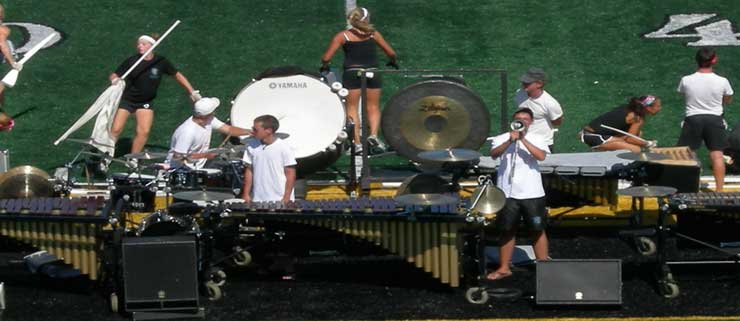 Being a successful musician in today’s society often requires
a high level of versatility. Many younger music educators are finding themselves
teaching privately, and often at a school or two, freelancing at night with
various performing groups all while continuing to perfect their craft. Chris White
is an up and coming pianist living in the Chicago
area who epitomizes this type of working musician. Currently working on his
third music degree, Chris maintains a busy schedule of teaching and performing
throughout the Midwest.
Being a successful musician in today’s society often requires
a high level of versatility. Many younger music educators are finding themselves
teaching privately, and often at a school or two, freelancing at night with
various performing groups all while continuing to perfect their craft. Chris White
is an up and coming pianist living in the Chicago
area who epitomizes this type of working musician. Currently working on his
third music degree, Chris maintains a busy schedule of teaching and performing
throughout the Midwest.
Chris sat down with us this week to discuss the impact his teachers have had on his career, and gives some poignant advice to other young music teachers who are in a similar situation as he is.
MW: How did you get your start as a piano teacher?
CW: I taught a few students informally during high school but never had regular students until I taught a few kids at the Little Fingers Piano Academy in Toronto, where I grew up. While my undergraduate degree was not in music (it was in English literature), I was sometimes approached for lessons and would offer them occasionally while I was in school. It wasn’t until I started my Masters degree in jazz studies at Indiana University that I got heavily involved in teaching.
MW: Did any of your teachers have an influence on your private teaching approach?
CW: I’ve been fortunate to have several great teachers and all have influenced my private teaching approach in various ways. David Baker at Indiana University has had a great impact on my approach. From him I learned the importance of challenging the student while maintaining a sense of humor and levity during the lesson. Barry Harris, another master teacher, has a similar teaching style.
Mark Eisenman is a wonderful jazz pianist based in Toronto. He showed me that both the teacher and student listening to recordings together during the lesson is a great way to occasionally enhance the lesson experience. He also has a wonderful concept of phrasing, something he calls the “even goes to odd†method that I share with my students. In general I liked his systematic approach to teaching jazz – it was a revelation to know that one could learn the bebop language through both exercises and careful listening.
From Luke Gillespie at Indiana University I learned the importance of the teacher acting as the coach or problem-solver. This means that the teacher is empathetic towards the student and attempts to find out what that student needs individually, rather than forcing any kind of system or blanket approach. Luke is very good at demonstrating various solutions to one kind of problem and his harmonic knowledge has been useful in my own teaching.
MW: How is going through the process of getting a DMA affected your teaching approach? Has it changed the way you approach your teaching methods?
CW: Though I am a new DMA student at the University of Illinois and I am not taking any pedagogy courses, I have furthered my knowledge of teaching through observation. Both Chip Stevens and Chip McNeill are great teachers with their own individual teaching styles. From their passion about the music I am reminded about my own initial passion I had for jazz, and why I decided to devote my life to this music. I hope this comes across to my own students.
MW: In your opinion how has technology, especially the internet, changed the landscape of music education in recent years and where do you see it headed in the future?
CW: Now that we are able to have audio and video lessons via the internet through programs like Skype, etc, long distance learning is possible. YouTube has been extremely helpful as a teaching tool as there are many jazz videos online that have been previously difficult to find.Â
I think websites have allowed teachers to reach a wider audience and are great forms of advertisement for teaching services. I digitally record many of my students’ lessons and send them the mp3 file through the net which has been a great thing – gone are the days of the unreliable cassette tape! I can’t say where technology is headed, but at the rate we are going it can only be headed in a positive direction.
MW: You are such an experienced and accomplished performer as well as an educator. How has your teaching experience influenced your performing and vice-versa?
CW: My teaching and performing often go hand in hand. I enjoy telling my students what I have played or learned from recent gigs - it keeps everything fresh and relevant. Teaching has forced me to think more systematically about what I play so that I can explain what I do. I think it’s important to show that what you perform can be learned and is within the reach of the student.Â
MW: What advice do you have for people who are just starting to teach piano?
CW: I would say that you should always be the best performer you can, be as solid as you can so that you can back up what you teach. Stay on top of recent developments in the piano world and always strive to improve as a teacher and performer. Subscribe to trade magazines and join organizations to be a part of a larger support network. Observe other teachers’ methods and learn from their systems. Realize that just like a performer, you can improve as teacher with practice and diligence.
MW: What advice do you have for students when they are looking for a private piano teacher?
CW: It would depend on the goals of the student. If you are a beginner I would recommend finding a teacher who stresses fundamentals. If you are at the intermediate or advanced level ask a local performer that you admire for a lesson. Even if they do not teach they may be able to direct you to someone who does. In general a good place to start would be to call / e-mail a local college and ask if you could meet with one of the faculty members to get a recommendation.
MW: Thanks for talking with us today.
CW: Anytime.







 Scroll down to view the comparison chart of over a dozen different portable digital audio recorders.
Scroll down to view the comparison chart of over a dozen different portable digital audio recorders.